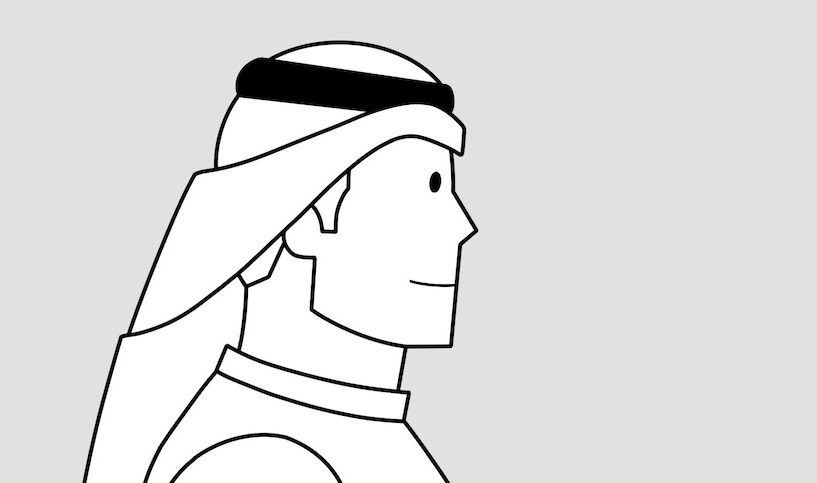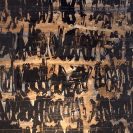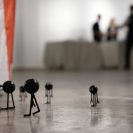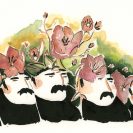Comics are an interesting and exciting medium. They’re an expressive combination of text and visuals that can convey a wide range of ideas and tell diverse stories in a tiny space. Historically, people dismissed their importance as a tool for discourse. Yet, in today’s fast-paced world, they are the perfect way to make a poignant statement in a couple of pictures. Notable Kuwaiti comic artist, Hashem Behbehani, is doing just that on Instagram. Hashem’s unique work, which merges art with social commentary, has garnered substantial attention, exemplified by up to 6,000 likes per post from his 10,000 followers on Instagram. This high engagement ratio is a testament to the impact and relevance of his content. We met up with him to learn more about his journey.

Can you share a bit about your background, and what initially inspired you to become a comic artist?
My path to becoming a comic artist was in no way a straight line. In school, I enjoyed drawing objects, focusing on their highlights and shadows. However, I felt limited in what I could do with the medium. For most of my university life in the US, I stopped drawing completely, dedicating time to my other passion: information systems. Upon returning to Kuwait in 2012, reverse culture shock urged me to share my experiences. Drawing comics came naturally, but I stopped shortly after. It wasn’t until covid lockdown that I started again.
Your character is based on yourself. What aspects of your personality or life experiences have you incorporated into this character?
My comics stem from my feelings, experiences, and observations. They expose elements of my personality which I believe to be sarcastic, analytical, and realistic. I like to think of my comics as a visual journal that I share with the world.

What motivates you to address social and political issues in Kuwait through your comics?
My focus on Kuwait started by chance after posting a comic about the paddle craze in 2022. The reactions I received revealed a significant need for art commentary on local political and social issues. This realization was exciting as I had so much more to share.
What kind of impact do you believe your comics have on your audience, especially in terms of awareness and discussion about the issues you address?
I never thought that my interests in history and politics would be beneficial. I gradually realized I could incorporate them into my comics, thereby informing people who are generally uninterested in politics or do not understand certain parts of it. Many people feel heard as I try to speak to the frustrations of a significant portion of the population.

Could you please walk us through your creative process? How do you go from an idea to a fully realized comic strip?
My ideas come from observing everyday life. I jot down my thoughts in my notes, sketching them if possible. Every idea must have a message that speaks to myself and others. Gradually I move over to my iPad, adding more detail with every draft I make until I reach a satisfying result. The process usually takes no less than a week.
What are some of the challenges you face when creating comics that address sensitive or controversial topics?
My main challenge arises when I post to multiple social media apps and accounts. Audiences vary quite drastically. Some might see my comics as a bit too pessimistic or aggressive.
Sometimes reposts might be taken out of context. Those who follow my work know that my criticism comes from a good place.

How does your audience respond to your work?
Most of the responses I receive are positive and encouraging. It is clear to me that demonstrating a point comically regularly comes across as stronger yet less aggressive than plain text, resulting in discussions that are beneficial for everyone involved.
In what ways does Kuwaiti culture influence your storytelling and artistic style?
The freedom of speech available to us in Kuwait has a big influence on my storytelling ability, as it gives me ample room to criticize and joke about serious topics that affect everyone in the
country. No country is perfect, and I appreciate our system’s acceptance to exposing its own flaws.
Do you have any personal favorite comics that you’ve created? If so, which ones and why?
I have multiple favorites so far. One of them is a post I made for the elections in 2023 which I titled “Honest Campaigns”. It showcased a spectrum of false promises we typically see from parliamentary candidates. Another favorite is a post I made about the Palestinian struggle, given its impact on a wide range of viewers.

Are there any new themes or projects you are currently working on or plan to explore in your future comics?
I constantly have a list of topics and themes I want to approach, but I never plan too far ahead, as I like to react to life events as they unfold. This helps me maintain the feel of a visual journal.
As someone who has successfully pursued their passion uniquely, what advice would you give to individuals looking to follow their passions?
One advice I always repeat is to never think it’s too late. We often give up on our dreams, thinking the train has passed, but people would be surprised how much progress can be made with the time they have left. Lost time can be made up, and second chances can exist. Delays do not always mean a smaller chance of success.

Do you have any final words or messages for your readers and fans?
I never expected that I would resume making art, or for it to be appreciated on the level it is today. I appreciate my fans, and anyone who reacts to my work, whether negatively or positively. Thank you for taking the time to read my story.
Find more inspiring stories by the Social Culture Club @socialcultureclub on Instagram. Stay up to date with Hashem Behbehani @hb.comics on Instagram.











